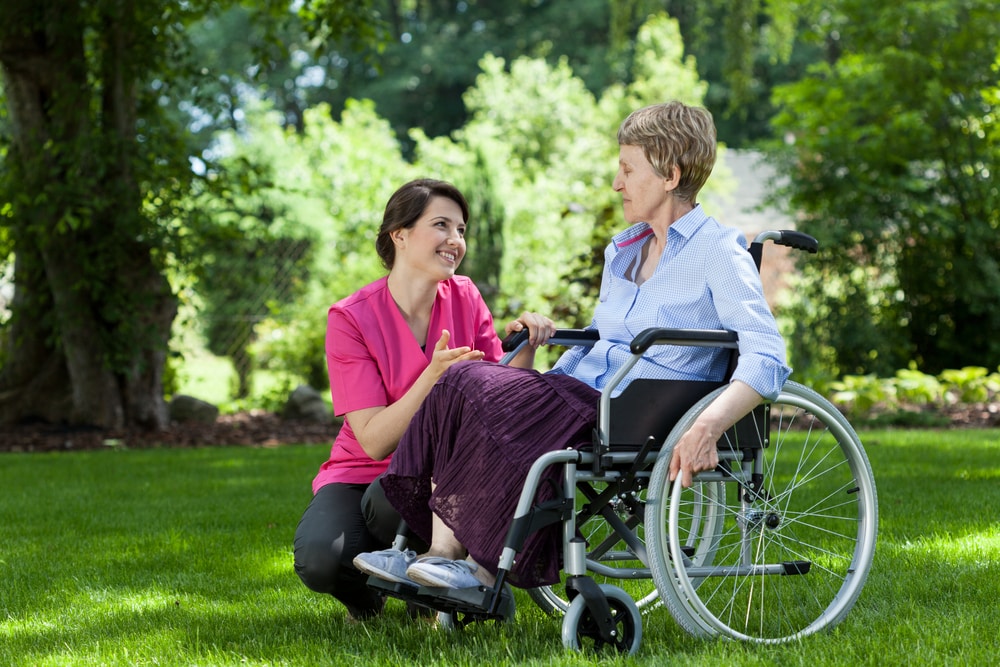Over 11 million people in the UK have some form of disability, and over a million of those use a wheelchair, without many others using walking aids or having restricted mobility. With almost half of these people at retirement age, that means a lot of them will be in the group that enjoys gardening. So how to make an accessible garden for all?

Over 11 million people in the UK have some form of disability, and over a million of those use a wheelchair, without many others using walking aids or having restricted mobility. With almost half of these people at retirement age, that means a lot of them will be in the group that enjoys gardening. So how to make an accessible garden for all?
Natural grass, slate, gravel and wood chippings are cheap options for garden landscaping, and they are visually appealing too. But none of them are particularly disabled-friendly, especially for wheelchair users. So what is the answer? If you are looking for something that looks good, is low maintenance, cost effective and accessible, then you have to consider artificial grass. Here’s why.
Artificial grass provides an even surface for wheelchair users
Wheelchair users and those who use walking frames benefit from an even surface. Natural grass tends to undulate, and can be quite hazardous due to its long blades concealing lumps, bumps and dips. Wheelchairs can sink into a natural lawn, especially following wet weather where the surface becomes muddy. The same goes for wood chippings.
Gravel and slate are a complete no-no for wheelchairs. The stones get caught in the wheels and can cause damage to the chair.
An artificial lawn, however, provides a consistently even surface. Ahead of its installation, the ground is levelled out to ensure it is perfectly flat. You have the option to choose a short pile height too, which is easier on the wheels.
Fake grass looks visually appealing year round
Fake turf is unaffected by the weather. There is no mud, and it doesn’t get slippery or fill with puddles, because artificial grass drainage is sound. So wheelchair and walking frame users can access their gardens in safety.
But the great thing about artificial turf is that it looks good. You could of course landscape your garden with concrete or paving. But where’s the greenery? If you are a fan of a lush looking garden, fake grass is the ultimate compromise.
Synthetic turf is low maintenance
For the disabled gardener, keeping maintenance to a minimum is important. Natural grass needs to be mowed, weeded, seeded, fed and watered to keep it looking its best. But fake turf doesn’t require any of this sort of care.
Yes you will need to brush it and remove any debris such as leaves. But compared to natural grass, an artificial lawn really is low maintenance.
Artificial grass is good for garden furniture
For those who enjoy a peaceful sit down in their gardens, artificial turf provides the ideal surface for garden furniture.
On a natural lawn, seats tend to sink into the surface. They may also cast shadows on the lawn, leading to unsightly yellow patches. As long as there are no sharp edges on your garden furniture, it can safely be placed on artificial grass without causing any damage.
Looking to create disabled friendly garden with artificial grass? Choose Astro Warehouse for guaranteed quality.
At Astro Warehouse we offer a wide selection of fake grass ranges, plus a variety of installation materials, providing all you need to fit your synthetic lawn. As artificial grass suppliers go, we are one of the most trusted in the UK, and offer an 8-year guarantee on all our fake grass products for complete peace of mind.
For premium quality astro turf at the most competitive prices you’ll find for this grade of product, please get in touch.
